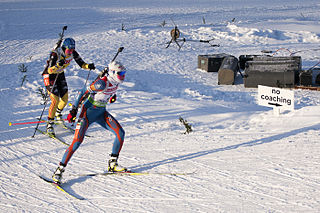
The first Biathlon World Championships (BWCH) was held in 1958, with individual and team contests for men. The original team event, Team (time), was held for the last time in 1965, to be replaced in 1966 by the team event, Relay, which we know today. The number of events has grown significantly over the years. Beginning in 1984, women biathletes had their own World Championships, and finally, from 1989, both genders have been participating in joint Biathlon World Championships. In 1978 the development was enhanced by the change from the large army rifle calibre to a small bore rifle, while the range to the target was reduced from 150 to 50 meters.
The World Athletics Championships are a biennial athletics competition organized by World Athletics. Alongside the Olympic Games, they represent the highest level championships of senior international outdoor athletics competition for track and field athletics globally, including marathon running and race walking. Separate World Championships are held by World Athletics for certain other outdoor events, including cross-country running and half-marathon, as well as indoor and age-group championships.

Cross country running is a sport in which teams and individuals run a race on open-air courses over natural terrain such as dirt or grass. The course, typically 3–12 kilometres (1.9–7.5 mi) long, may include surfaces of grass and earth, pass through woodlands and open country, and include hills, flat ground and sometimes gravel road and minor obstacles. It is both an individual and a team sport; runners are judged on individual times and teams by a points-scoring method. Both men and women of all ages compete in cross country, which usually takes place during autumn and winter, and can include weather conditions of rain, sleet, snow or hail, and a wide range of temperatures.
The World Allround Speed Skating Championships are a series of speed skating events held annually to determine the best allround speed skater of the world. The event is held over two days, with all skaters entering the first three distances and the best eight skaters over these distances getting to ride the last event. The results of the races are converted to points, and the skater with lowest total score wins the championship.

The European Aquatics Championships is the continental Aquatics championship for Europe, which is organised by LEN—the governing body for aquatics in Europe. The Championships are currently held every two years ; and since 2022, they have included 5 aquatics disciplines: Swimming, Diving, Synchronised swimming, Open water swimming and High diving. Prior to 1999, the championships also included Water polo, which beginning in 1999 LEN split-off into a separate championships. The open water events are not held during the Olympic year.
The World Rowing Championships is an international rowing regatta organized by FISA. It is a week-long event held at the end of the northern hemisphere summer and in non-Olympic years is the highlight of the international rowing calendar.
The European Rowing Championships is an international rowing regatta organised by FISA for European rowing nations, plus Israel, which, though not a member of the European federation, is treated as a European nation for competition purposes.

The FIFA U-20 Women's World Cup is an international association football tournament, organized by FIFA, for national teams of women under the age of 20. The tournament is held in even-numbered years. It was first held in 2002 as the FIFA U-19 Women's World Championship with an upper age limit of 19. In 2006, the age limit was raised to the current 20. The event was renamed as a World Cup since the 2008 competition, making its name consistent with FIFA's other worldwide competitions for national teams.

The FIS Nordic World Ski Championships is a biennial Nordic skiing event organized by the International Ski Federation (FIS). The World Championships was started in 1925 for men and opened for women's participation in 1954. World Championship events include Nordic skiing's three disciplines: cross-country skiing, ski jumping, and Nordic combined. From 1924 to 1939, the World Championships were held every year, including the Winter Olympics. After World War II, the World Championships were held every four years from 1950 to 1982. Since 1985, the World Championships have been held in odd-numbered years.

EuroBasket Women is a biennial international women's basketball competition held between the nations of FIBA Europe for women's national teams. EuroBasket Women is also used as a qualifying tournament for the FIBA Women's World Cup and also the Olympic Games.
The FIFA U-17 Women's World Cup is a biennial international women's association football tournament for female players under the age of 17. It is organized by Fédération Internationale de Football Association (FIFA) since 2008. The current champions are Spain, who won its second title at the 2022 edition in India.
The FIBA Women's Basketball World Cup, also known as the Basketball World Cup for Women or simply the FIBA Women's World Cup, is an international basketball tournament for women's national teams held quadrennially. It was created by the International Basketball Federation (FIBA). Its inaugural game was in 1953 in Chile, three years after the first men's World Championship. For most of its early history, it was not held in the same year as the men's championship, and was not granted a consistent quadrennial cycle until 1967. After the 1983 event, FIBA changed the scheduling so that the women's tournament would be held in even-numbered non-Olympic years, a change that had come to the men's tournament in 1970.
The UCI Road World Championships are the annual world championships for bicycle road racing organized by the Union Cycliste Internationale (UCI). The UCI Road World Championships consist of events for road race and individual time trial, and as of 2019, a mixed team relay.

The UCI Track Cycling World Championships are the set of world championship events for the various disciplines and distances in track cycling. They are regulated by the Union Cycliste Internationale. Before 1900, they were administered by the UCI's predecessor, the International Cycling Association (ICA).

The World Table Tennis Championships are table tennis competitions sanctioned by the International Table Tennis Federation (ITTF). The World Championships have been held since 1926, biennially since 1957. Five individual events, which include men's singles, women's singles, men's doubles, women's double and mixed doubles, are currently held in odd numbered years. The World Team Table Tennis Championships, which include men's team and women's team events, were first their own competition in 2000. The Team Championships are held in even numbered years.
The Artistic Gymnastics World Championships are the world championships for artistic gymnastics governed by the Fédération Internationale de Gymnastique (FIG). The first edition of the championships was held in 1903, exclusively for male gymnasts. Since the tenth edition of the tournament, in 1934, women's events are held together with men's events.
The World Weightlifting Championships is an international weightlifting competition, currently held annually by the International Weightlifting Federation (IWF). The predecessor organization of the IWF was founded in 1905, but World Championship events began before its foundation. The first recognized World Championship event was held in 1891, and was won by Edward Lawrence Levy of England.

WWE Money in the Bank is a professional wrestling event, produced annually since 2010 by the American company WWE, the world's largest professional wrestling promotion. The event is named after the Money in the Bank ladder match, a multi-person ladder match in which participants compete to obtain a briefcase that contains a contract for a championship match, which can be "cashed in" at a time and place of their choosing within the next year. The match originally only took place at WWE's flagship event, WrestleMania, from 2005 to 2010, after which, the match concept was spun off into its own event beginning in July that year with the match no longer occurring at WrestleMania. In addition to airing on traditional pay-per-view (PPV) since the inaugural 2010 event, the event has been available via livestreaming since the 2014 event. It has since become recognized as one of the company's five biggest annual events of the year, along with the Royal Rumble, WrestleMania, SummerSlam, and Survivor Series, referred to as the "Big Five".









